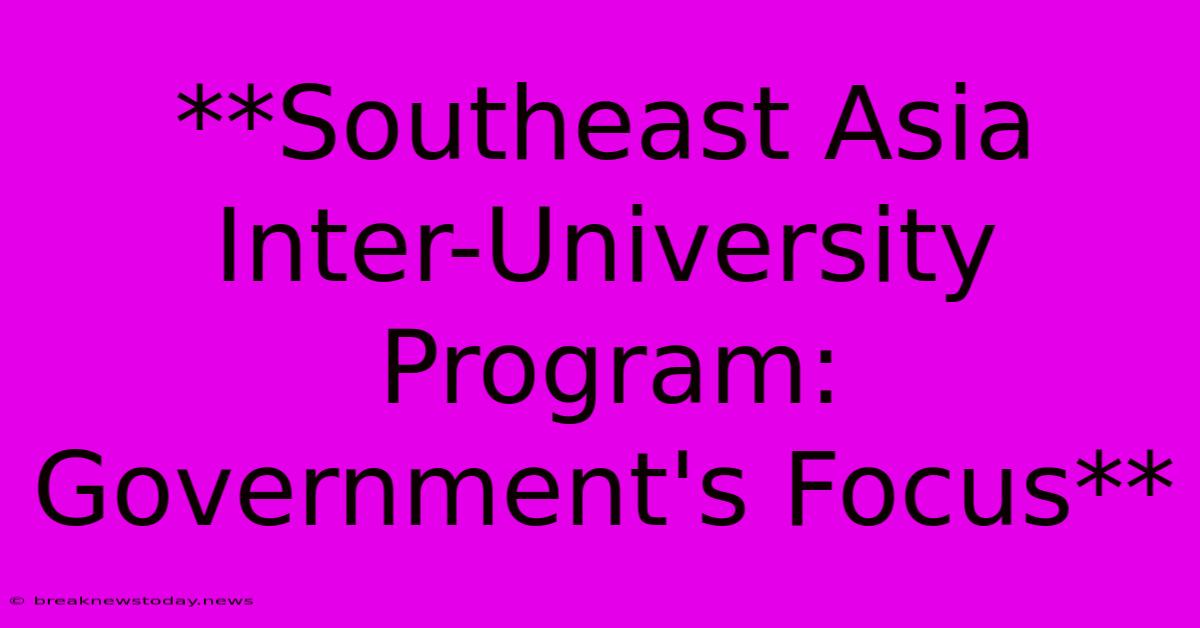**Southeast Asia Inter-University Program: Government's Focus**

Discover more detailed and exciting information on our website. Click the link below to start your adventure: Visit Best Website naughtynakes.com. Don't miss out!
Table of Contents
Southeast Asia Inter-University Program: Government's Focus on Regional Collaboration
Southeast Asia is a region brimming with diverse cultures, vibrant economies, and a shared history. Recognizing the importance of regional collaboration, governments in the region are placing increasing emphasis on inter-university programs. These initiatives aim to foster academic exchange, promote research collaboration, and cultivate a new generation of leaders equipped to tackle the challenges and opportunities of the 21st century.
Why is Inter-University Collaboration Crucial?
Inter-university programs offer numerous advantages, both for individual students and for the region as a whole:
- Enhanced Learning: Students gain exposure to different educational systems, teaching methods, and cultural perspectives, broadening their horizons and enriching their learning experience.
- Research Synergy: Collaborative research initiatives across universities in Southeast Asia bring together diverse expertise, leading to innovative solutions to regional problems in areas like sustainability, public health, and economic development.
- Regional Integration: These programs foster a sense of regional identity and cooperation, building bridges between nations and fostering a deeper understanding of shared challenges and opportunities.
- Talent Development: The programs cultivate a pool of highly skilled graduates with the knowledge and experience to contribute to the region's growth and development.
Government Initiatives: A Catalyst for Regional Collaboration
Governments in Southeast Asia are actively promoting inter-university programs through various initiatives:
- Funding Programs: Governments are allocating resources to support student exchange programs, joint research projects, and faculty development initiatives.
- Institutional Partnerships: Governments are facilitating partnerships between universities in different countries, establishing frameworks for collaboration and exchange.
- Curriculum Development: Governments are encouraging the development of joint degree programs and curricula that address the needs of the region and prepare students for the evolving job market.
- Policy Frameworks: Governments are putting in place policies and regulations that encourage and support inter-university collaborations.
Focus Areas for Inter-University Programs
The focus of inter-university programs varies depending on the specific needs and priorities of each country. However, some common areas of focus include:
- Sustainable Development: Research and development initiatives aimed at addressing environmental challenges, promoting sustainable practices, and building resilient communities.
- Public Health: Collaborations on tackling emerging health threats, improving healthcare systems, and promoting public health awareness.
- Economic Development: Joint research on regional economic integration, promoting entrepreneurship, and fostering inclusive economic growth.
- Digital Innovation: Collaborative efforts to advance digital literacy, promote technology adoption, and build a thriving digital economy in the region.
The Future of Inter-University Collaboration
The future of inter-university programs in Southeast Asia is bright. Governments are committed to further strengthening these initiatives, recognizing their crucial role in building a more integrated, prosperous, and sustainable region.
By fostering collaboration between universities, governments are investing in the future of Southeast Asia, empowering young minds to become agents of change and contribute to the region's development.

Thank you for visiting our website wich cover about **Southeast Asia Inter-University Program: Government's Focus**. We hope the information provided has been useful to you. Feel free to contact us if you have any questions or need further assistance. See you next time and dont miss to bookmark.
Featured Posts
-
Napolis European Goal Amid Title Contention Conte
Nov 02, 2024
-
Helenas Terugkeer Nrj Awards Met Lenie
Nov 02, 2024
-
Novembro Azul Junte Se A Luta Contra O Cancer De Prostata
Nov 02, 2024
-
Prediccion Del Partido Frankfurt Vs Bochum
Nov 02, 2024
-
Bridge The Gap Dating Younger
Nov 02, 2024
